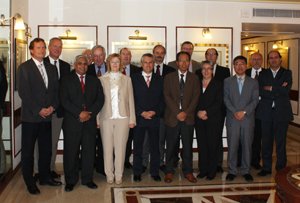
First complete mattress system to earn Standard 100 by Oeko-Tex
With 11,283 certificates issued in the last year alone, and more than 9,500 companies involved in the scheme in over 90 countries, the OEKO-TEX organisation says its OEKO-TEX Standard 100 has once again confirmed its position as the world's leading certification scheme for textiles tested for harmful substances. That was the conclusion of this year's meeting of the heads of OEKO-TEX institutes, which, in view of the growing number of certificates issued to production

16th November 2011
Innovation in Textiles
|
Delhi
With 11,283 certificates issued in the last year alone, and more than 9,500 companies involved in the scheme in over 90 countries, the OEKO-TEX organisation says its OEKO-TEX Standard 100 has once again confirmed its position as the world's leading certification scheme for textiles tested for harmful substances.
That was the conclusion of this year's meeting of the heads of OEKO-TEX institutes, which, in view of the growing number of certificates issued to production companies in Asian countries such as India, took place in Delhi for the first time, on 7 and 8 November.
The agenda included decision-making on the new version of the OEKO-TEX list of criteria, and internal agreement by the 15 OEKO-TEX member institutes on existing quality control procedures to ensure a consistent standard of testing and compliance with the required product quality, as well as on the question of international trademark protection for the "Confidence in Textiles" label.
Another focus for discussion at the meeting was an analysis of the company audits that were introduced in 2010. Since April last year, said OEKO-TEX General Secretary Dr. Jean-Pierre Haug, the OEKO-TEX Association had already visited over 2000 companies internationally as part of the certification process, in order to give them customised support with implementing the OEKO-TEX requirements regarding operational quality control.
"When we carry out company audits on the spot, we can clarify any unresolved issues face to face with the quality managers, and so help the companies to gain maximum value for money from the certification process."
It was therefore unanimously agreed by the General Managers of the OEKO-TEX institutes that global company monitoring would continue. The aim is for all certificate-holders to have been successfully audited by 2013.
The OEKO-TEX representatives also unanimously confirmed the initiative by the technical OEKO-TEX Executive Committee to introduce checking for alkylphenol ethoxylates (APEOs) such as nonylphenol as a requirement for product certification under the OEKOTEX Standard 100 in future.
From January 2012, nonylphenol, nonylphenol-(1-9) ethoxylates, octylphenol and octylphenol-(1-2) ethoxylates will be included in the OEKOTEX list of criteria, so from April 2013 companies will be obliged to comply with the defined limit values in all certification processes. By also regulating these substances under the product-related OEKO-TEX Standard 100, the OEKO-TEX Association expects to have a significant impact on the global textile chain so that the use of these kinds of tensides will be considerably reduced.
In order to start helping to eliminate alkylphenol ethoxylates even sooner, the OEKO-TEX Association will begin testing for alkylphenol ethoxylates straight away as part of its regular control tests, and during company audits it will be helping certificate-holders to identify at this early stage the possible sources of this group of substances in their delivery chain, and to find substitutes.
Alkylphenol ethoxylates have been excluded since 1995 under the production-based certification of environmentally friendly production sites in accordance with the OEKO-TEX Standard 1000, and are tested for accordingly by the OEKO-TEX member institutes.
The OEKO-TEX General Managers attending the meeting in Delhi were also unanimous in agreeing to extend the scale of regular control testing of certified products worldwide from the current level of at least 15% of all certificates issued annually to 20% in future. In practice, in recent years an average of 18% of the certificates have already been tested at the OEKO-TEX Association's own expense, using product samples taken from retailers.
Another innovation that was introduced at the meeting was a supplement listing additional specifications which would enable special articles such as tents, buggies or push-chairs, office chairs and rucksacks to be certified under the OEKO-TEX Standard 100, with immediate effect.
Finally, the heads of the OEKO-TEX institutes announced that the forthcoming 20th anniversary next year of testing for harmful substances under the OEKO-TEX Standard 100 would be appropriately marked by some special promotions. Planned projects include a re-launch of the existing 16-language website at www.oeko-tex.com , a specialist international conference, a Knowledge Olympics for specialist retailers in eight European countries and a competition for a media and corporate prize on the theme of sustainability.
The host country for this year's heads of institute meeting, India, has issued 624 currently valid OEKO-TEX certificates, placing it fifth in an international comparison of the countries issuing the most certificates, behind China, Germany, Turkey and Italy.
Since the first OEKO-TEX branch office was opened in India in 2005, demand for OEKO-TEX product certifications from local companies at all stages of the processing chain is said to have increased steadily and continues to do so. Customer enquiries are now handled by four OEKO-TEX agencies in Mumbai, Delhi, Tirupur and Ahmedabad, with a further office in Sri Lanka.

Business intelligence for the fibre, textiles and apparel industries: technologies, innovations, markets, investments, trade policy, sourcing, strategy...
Find out more